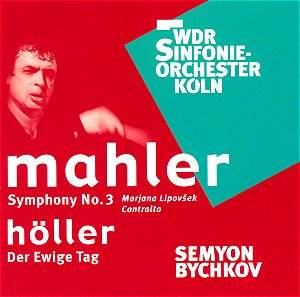Although it is difficult to imagine many purchasing
this set for the 24-minute Höller, it is nevertheless there
where the principal attraction lies. York Höller’s music
has never really taken off in the UK, for no good reason that
I can determine. Der Ewige Tag (‘The Eternal Day’, for
orchestra and choir) is an intense and tautly-argued essay that
progresses on several levels: through time in the choice of its
texts (‘The Morning’, by Ibn Sharaf; ‘The Day’, by Georg Heym,
and finally ‘The Night in Isla Negra’ by Pablo Neruda), through
space (the three poems move from East to West) and through extended
time in the traversal of three epochs (Oriental Middle Ages –
early modern era – present day).
The booklet note gives in some detail Höller’s
theoretic ideas of Klanggestalt (inspired by the DNA sequence,
and which determines the work’s minutiae). As so often with this
composer, there is some sort of electronic intervention (it was,
after all, written to celebrate the 50th anniversary
of the WDR Studio for Electronic Music), and here it is the sampled
harp sounds that are of note. One thing is for sure – the Cologne
orchestra relishes the challenge (in fact they almost seem at
home with it). The sometimes violent, sometimes shadowy world
encompasses also two quotes from Mahler (a neat link to the main
body of this set). But here the origin is from the Seventh Symphony,
and the link is to Night (around 13’40 and 18’45ff). The quotes
are certainly nightmarish. If only the poetry was translated (Höller’s
title, incidentally, comes form the umbrella title of Heym’s 1911
poetry collection). Bychkov’s strengths are heard here full-force.
He can delineate textures expertly without falling into the trap
of being overly clinical. Höller’s disturbing dreamscape
is revealed in all its dark majesty (QUOTE 1).
Recorded at the time of the work’s première,
the Höller is of course alone in the catalogue. The same
can hardly be said of the Mahler Third. Klaus Tennstedt on EMI
with the LPO has long held my affection and Bychkov cannot displace
him. Neither can he upstage Boulez or Abbado. But he nevertheless
has much to recommend him. The recording is exemplary (detail
is excellent) and the fifth movement, ‘Es sungen drei Engel’ is
as lusty as could be from the girls and boys of Cologne Cathedral.
If only Bychkov was able to enter into Mahler’s shadowy side.
His clinical approach eschews the ominous tread of a nightmarish
processional and he can gloss over the composer’s bizarrist side.
Romantic gestures can be under-projected. Take away Mahler’s Romanticism
and one is left with a deconstruction that needs to be very carefully
handled (à la Sinopoli on a good day; Boulez, too, can
carry this approach convincingly). Having stripped down the surface,
Bychkov seems to offer too little in return, despite the orchestra’s
willingness to play its socks off for him.
The second movement is perhaps not as innocent
(or even faux-innocent) as it could be, although episodes can
be shadowy. The third movement features an excellent post-horn
player (Peter Mönkediek) and some similarly excellent French
Horn playing (although the latter is too closely-miked). Lipovšek
is marvellously creamy of tone. The finale sums up the performance.
It is intelligently shaped and balanced, very expertly played
yet not the shattering, emotionally exhausting experience it can
be in greater hands.
In summary, the Höller is required listening
(in LudwigvanWeb terms, it fully deserves a ‘Ludwig Forever’
rating). Endlessly fertile and a worthy pointer to further explorations
of this composer’s music, this disc’s international distribution
should at the very least further the Höllerian cause. I doubt,
however, that I shall be returning to the Mahler with any regularity.
Colin Clarke
